2017 年广西民族大学翻译硕士英语考研真题 A 卷
Part I. Basic English Knowledge (30%)
Section A: Multiple-choice (20 %)
Directions:Therearefortymultiple-choicequestionsinthissection.Choosethe
best answer to each question. Write your answers on the Answer Sheet.
1.After people have learned that magnets attract things, centuries passed ____ they
took note of the fact that magnets sometimes also repel things.
A. before
C. after
B. until
D. since
2.Most of North America receives _________ some form of continuous plant cover
except in the arid and semiarid Southwest.
A. moisture to sustain sufficient
B. sufficient moisture to sustain
C. to sustain sufficient moisture
D. sufficient to sustain moisture
3._________ industries, inventions, and communal endeavors of the Shakers, the best
known is their fine furniture.
A. Of the many
C. Are the many
B. Their many
D. Many of the
4. A condenser is a heat exchanger _________ steam or vapor loses heat and returns
to liquid form.
A. what
C. in whose
B. in which
D. that
5.
Settled by English Puritans in 1630, Boston became _________.
A. so that the capital of the Massachusetts Bay Colony
B. the Massachusetts Bay Colony its capital
C. it was the capital of the Massachusetts Bay Colony
D. the capital of the Massachusetts Bay Colony
6.
The scents of the flowers was______ to us by the breeze.
A. intercepted
C. saturated
B. detested
D. wafted
7.If you______ something, such as food or drink, you reduce its quality or make
it weak, for example by adding water to it.
A. adulterate
B. moor
D. sue
C. vaccinate
8. Government loan have been the______ of several shaky business companies.
A. tornado
C. delinquency
9. She made shorthand notes which she later _
B. salvation
D. momentum
.
�
B. Since
D. There being
B. underdog
D. underworld
B. described
D. transcribed
_ either Mary have to leave, or me.
A. inscribed
C. prescribed
He gave me an
A. ulcer
C. ultimatum
11. _____ no cause for alarm, the old man went back to his bedroom.
A. There was
C. Being
I have never been to London, but that is the city_______.
A. where I like to visit most
C. which I like to visit mostly D. where I’d like most to visit
The experiment requires more money than _______.
A. has been put in
C. have been put in D. to be put in
Fat cannot change into muscle ______muscle changes into fat.
A. no more than
C. no less than
She managed to save _______she could out of her wages to help her brother.
A. how little money B. so little money
C. what little money
16. A cinema was burnt out in north London last night. Police suspect _ .
A. armpit
C. arson
She trimmed the _
B. any more than
D. much more than
D. such little money
B. arsenal
D. artifact
B. I’d most like to visit
B. being put in
of the tulips before putting them in a vase.
D. stalks
B. spruce
A. sprig
C. stakes
It was as a physician that he represented himself, and_____ he was warmly received.
A. as such
C. as that
While most people would _
positively enjoy it.
A. accentuate
C. dehumanize
20.Even as a girl, _____to be her life, and theater audiences were to be her best
teachers.
B. such as
D. so that
at the prospect of so much work, Daniels seems to
B. collate
D. blanch
A.performing by Melissa were
B.Melissa knew that performing was
C.knowing that Melissa’s performances were
�
D.it was known that Melissa’s performances were
Section B:
Proofreading and Error Correction (10 %)
Directions: The following passage contains 10 errors. Each indicated line contains
a maximum of ONE error. In each case, only ONE word is involved. You should proofread
the passage and correct it.
Please write your answers on the Answer Sheet.
Many witnesses concerning the Chinese have told the truth, but perhaps
a few of them have succeeded in telling nothing but the truth, and no one of
(21)
them has ever told the whole truth. No single individual, whatever the extent
of his knowledge, could by any possible know the whole truth about the
(22)
Chinese.
The difficulty of comparing Chinese with Anglo-Saxons will be more
(23)
strongly felt by those who have attempted. To such it will soon become
(24)
evident that many things which seem “characteristic” of the Chinese are
merely Oriental traits; but in what extent this is true, each reader in the
(25)
light of his own experience must judge by himself.
It has been said that in the present stage of our intercourse with Chinese
(26)
there are three ways in which we can come to some knowledge of their
social life—by the study of their novels, their ballads, and their plays. Each
of these sources of information doubtless have its worth, but there is likewise
(27)
a fourth, more valuable than all of them combining, a source not open to every
(28)
one who wrote on China and the Chinese. It is the study of the family life of
(29)
the Chinese in their own homes. As the topography of a district can be much
better understood in the country than the city, so it is with the characteristics
(30)
of the people. A foreigner may live in a Chinese city for a decade, and not gain
�
as much knowledge of the interior life of the people as he can acquire by living
twelve months in a Chinese village.
Part II. Reading Comprehension (50 %)
Section A (30 %)
Directions: There are 2 passages in this section. Each passage is followed
bysomequestionsorunfinishedstatements.Foreachofthemtherearefourchoices
markedA),B),C)andD).Youshoulddecideonthebestchoiceandwriteyouranswers
on the Answer Sheet.
Passage One
Questions 31 to 39 are based on the following passage.
My Views on Gambling
Most of life is a gamble. Very many of the things we do involve taking some
risk in order to achieve a satisfactory result. We undertake a new job with no idea
of the more indirect consequences of our action. Marriage is certainly a gamble
and so is the bringing into existence of children, who could prove sad liabilities.
A journey, a business transaction, even a chance remark may result immediately or
ultimately in tragedy. Perpetually we gamble—against life, destiny, chance, the
unknown—call the invisible opponent what we will. Human survival and progress
indicate that usually we win.
So the gambling instinct must be an elemental one. Taking risks achieve
something is a characteristic of all form of life, including humanity. As soon as
man acquired property, the challenge he habitually issued to destiny found an
additional expression in a human contest. Early may well have staked his flint axe,
his bearskin, his wife, in the hope of adding to his possessions. The acquirement
of desirable but non-essential commodities must have increased his scope enormously,
while the risk of complete disaster lessened.
So long as man was gambling against destiny, the odds were usually in his favor,
especially when he used common sense. But as the methods of gambling multiplied,
the chances of success decreased. A wager against one person offered on average
even chances and no third party profited by the transaction. But as soon as
commercialized city life developed, mass gambling become common. Thousands of
people now compete for large prizes, but with only minute chances of success, while
the organizers of gambling concerns enjoy big profits with, in some cases, no risk
�
at all. Few clients of the betting shops, football pools, state lotteries, bingo
sessions, even charity raffles, realize fully the flimsiness of their chances and
the fact that without fantastic luck they are certain to lose rather than gain.
Little irreparable harm results for the normal individual. That big business
profits from the satisfaction of a human instinct is a common enough phenomenon.
The average wage-earner, who leads a colorless existence, devotes a small
percentage of his earnings to keeping alive with extraordinary constancy the dream
of achieving some magic change in his life. Gambling is in most cases a non-toxic
drug against boredom and apathy and many well preserve good temper, patience and
optimism in dreary circumstances. A sudden windfall may unbalance a weaker, less
intelligent person and even ruin his life. And the lure of something for nothing
as an ideal evokes criticism from the more rigidly upright representative of the
community. But few of us have the right to condemn as few of us can say we never
gamble—even it is only investing a few pence a week in the firm’s football sweep
or the church bazaar “lucky dip”.
Trouble develops, however, when any human instinct or appetite becomes
overdeveloped. Moderate drinking produces few harmful effects but drunkenness and
alcoholism can have terrible consequences. With an unlucky combination of
temperament and circumstances, gambling can only become an obsession, almost a
form of insanity, resulting in the loss not only of a man’s property but of his
self-respect and his conscience. Far worse are the sufferings of his dependents,
deprived of material comfort and condemned to watching his deterioration and
hopelessness. They share none of his feverish excitement or the exhilaration of
his rare success. The fact that he does not with to be cured makes psychological
treatment of the gambling addict almost impossible. He will use any means,
including stealing, to enable him to carry on. It might be possible to pay what
salary he can earn to his wife for the family maintenance but this is clearly no
solution.
Nothing — education,
home
environment,
other
interest,
wise
discouragement—is likely to restrain the obsessed gambler and even when it is
he alone who suffers the consequences , his disease is a cruel one, resulting in
a wasted, unhappy life.
Even in the case of the more physically harmful of human indulgences,
repressive legislation often increase the damage by causing more vicious
activities designed to perpetuate the indulgence in secret. On the whole, though
�
negative, gambling is no vice within reasonable limits. It would still exist in
an ideal society. The most we can hope for is control over exaggerated profits
resulting from its business exploitation, far more attention and research devoted
to the unhappy gambling addict and the type of education which will encourage an
interest in so many other constructive activities that gambling itself will lose
its fascination as an opiate to a dreary existence. It could be regarded as an
occasional mildly exciting game, never to be taken very seriously.
31. According to the author, we gamble regardless of the risk, because we
A. want to survive.
B. usually win in the gamble.
C. don’t know the indirect consequences of the action.
D. wish to achieve what may bring us satisfaction.
32. The bringing into existence of children is also a gamble because they may
A. be mentally retarded.
B. become our disappointment.
C. go against us.
D. become our opponents.
33. According to the passage, we all take risk in gambling because we are
A. born with the tendency of taking risks.
B. forced to achieve satisfactory result.
C. obliged to achieve what we desire.
D. born with the nature of achieving satisfaction.
34. The gambling instinct, according to the author, is reinforced by human’s desire
to
A. give up unnecessary property.
B. add more to their material possession.
C. get desirable commodities.
D. change their living conditions.
35. Which of the following is true?
A. If we dare to gamble, we will usually win.
B. If we use common sense to gamble, we will usually lose.
C. The luck is usually on our side so long as we have the confidence to change
our fate.
D. We all have the luck to win the gamble if we use common sense.
36. Which of the following is true?
A. The more methods to gamble, the fewer the chances to succeed.
B. Common sense plays a role in a gamble.
C. The more methods there are, the less profit we will make.
D. The more methods there are, the more chances for us to win a gamble.
�
37. Who get profits from gambling activities with no risks?
A. Those who organize the activities.
B. Those who often go to state lotteries.
C. Those who often go to football pools.
D. Those who do not take so seriously.
38.Many people would like to give away a small sum of money because they constantly
think the donation may
A. not affect their general income.
B. bring them unexpected big sums of money.
C. help them preserve their temper and patience.
D. bring them some pennies from heaven.
39. According to the author, gambling may lose its fascination if we
A. create more chances.
B. do not take it so seriously.
C. organize more other activities.
D. help develop an interest in other activities.
Passage Two
Questions 40 to 45 are based on the following passage.
Russia’s new revolution in conservation
When naturalist Sergei Smirenski set out to create Russia’s first private
nature reserve since the Bolshvik revolution, he knew that the greatest obstacle
would be overcoming bureaucratic resistance.
The Moscow State University professor has charted a steep course through a
variety of foes, from local wildlife service officials who covet his funding to
government officials who saw more value in development than conservation. But with
incredible dedication, and the support of a wide range of international donors form
Japan to the United States, the Murovyovka Nature Reserve has finally come into
being.
Founded at a small ceremony last summer, the private reserve covers 11000 acres
of pristine wetlands along the banks of the Amur River in the Russian Far East.
Here, amid forests and marshes encompassing a variety of microhabitats, nest some
of the world’s rarest birds—tall, elegant cranes whose numbers are counted in
the mere hundreds.
The creation of the park marks a new approach to nature conservation in Russia,
one that combines traditional methods of protection with an attempt to adapt to
the changing economic and political circumstances of the new Russia.
�
“There must be a thousand ways to save a wetland. It is time for vision and
risk, and also hard practicality,” wrote Jim Harris, deputy director of the
International Crane Foundation, a Wisconsin-based organization dedicated to the
study and preservation of cranes, which has been a major supporter of the Murovyovka
project.
Dr. Smirenski’s vision has been eminently down to earth. At every step, he
has tried to involve local officials, businessmen and collective farms in the
project, giving them a practical, economic stakes in its success. And with
international support, he is trying to introduce new methods of organic farming
that will be more compatible with preserving the wetlands.
40. The Murovyovka Nature Reserve came into being because of
A. Russian government officials.
B. the International Crane Foundation.
C. the determination of one man.
D. an unrealistic dream.
41.If one “charts a steep uphill course” (paragraph 2), one
A. expects an arduous journey.
B. maps out a mountain trip.
C. assumes that life will be uneventful.
D. sets himself a difficult goal.
42. The preserved “pristine wetlands” mentioned in paragraph 3 are
A. unspoiled.
C. immaculate.
B. precious.
D. uncontaminated.
43. The passage states that the Nature Reserve is
A. an arid, uninhabited area.
B. the only reserve in Russia.
C. home to many different birds.
D. economically beneficial to local inhabitants.
44. The passage implies that the preservation of wetlands
A.can only be accomplished with traditional methods.
B.requires imagination, daring and pragmatism.
C. is usually a popular concern of politicians.
D. limits an area’s development.
45. Where is the headquarter of the International Crane Foundation?
�

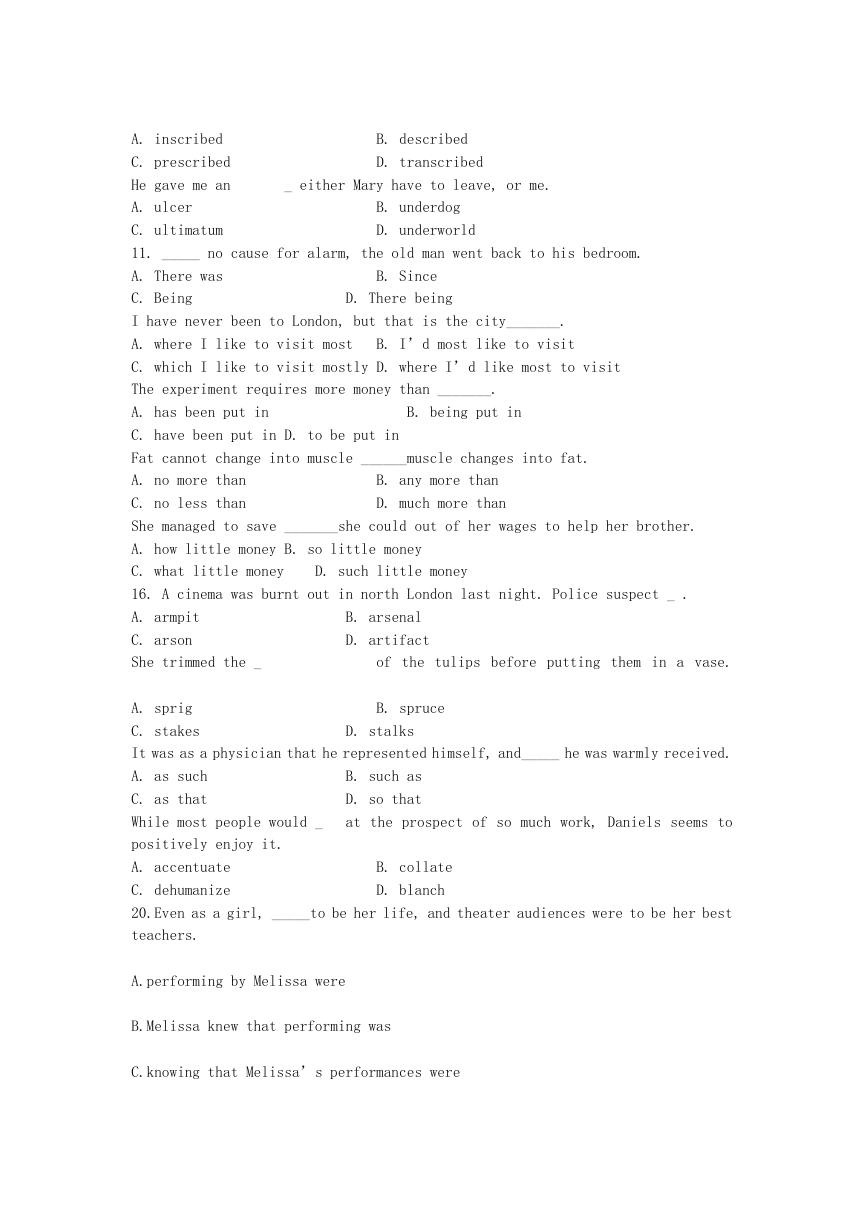
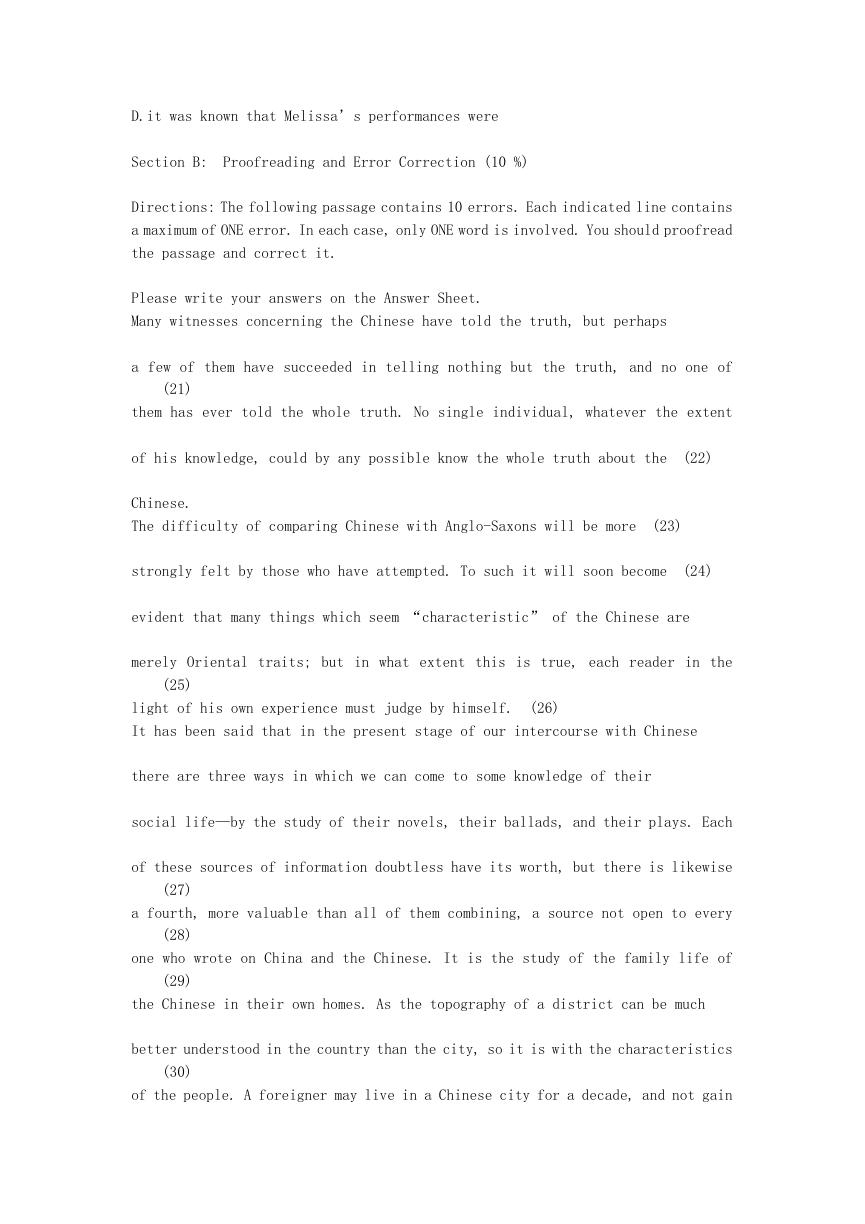
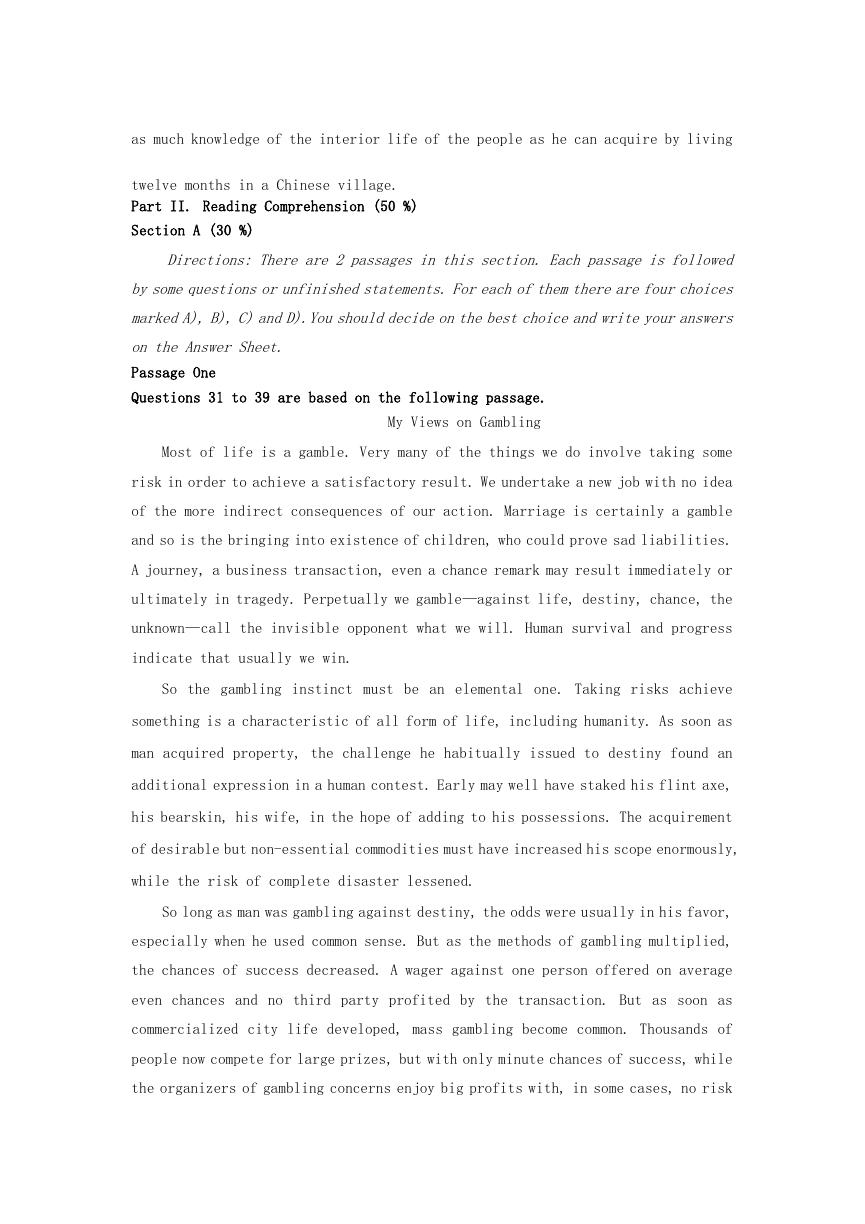
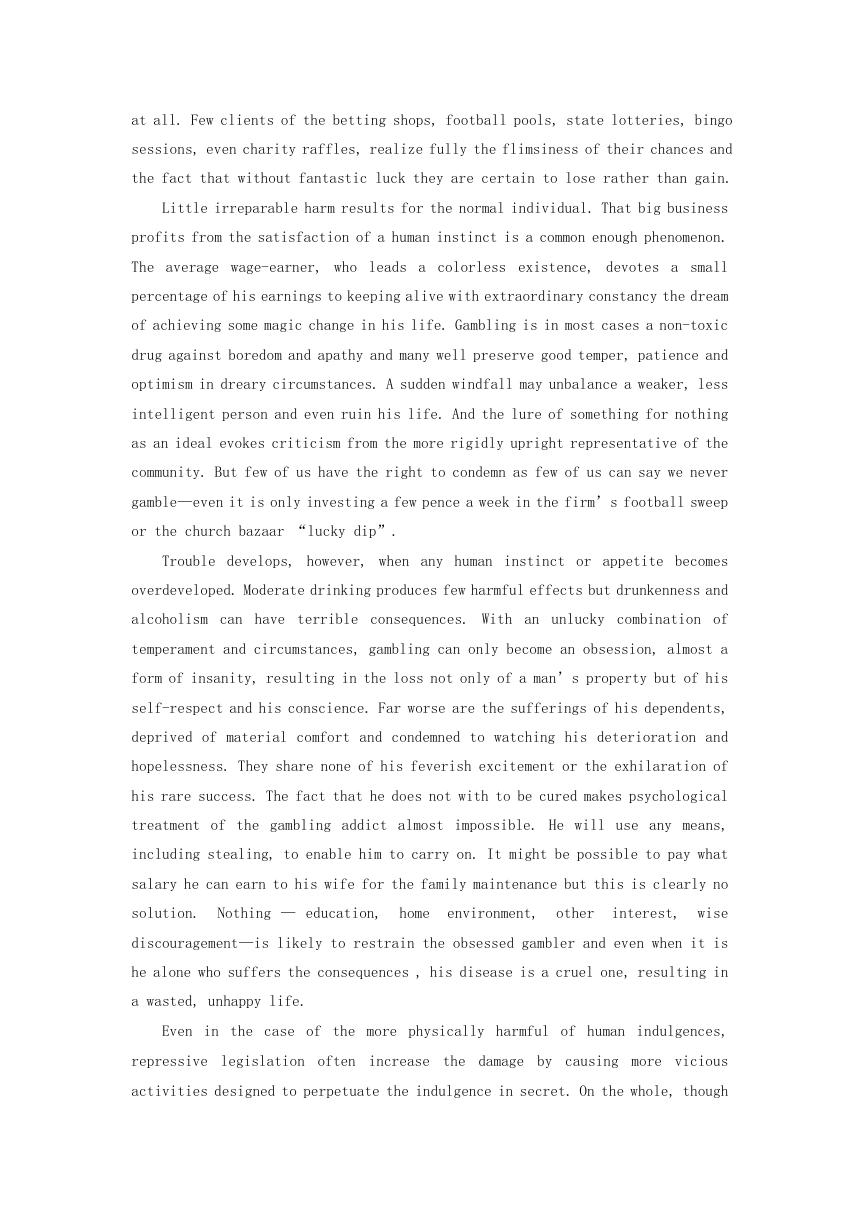
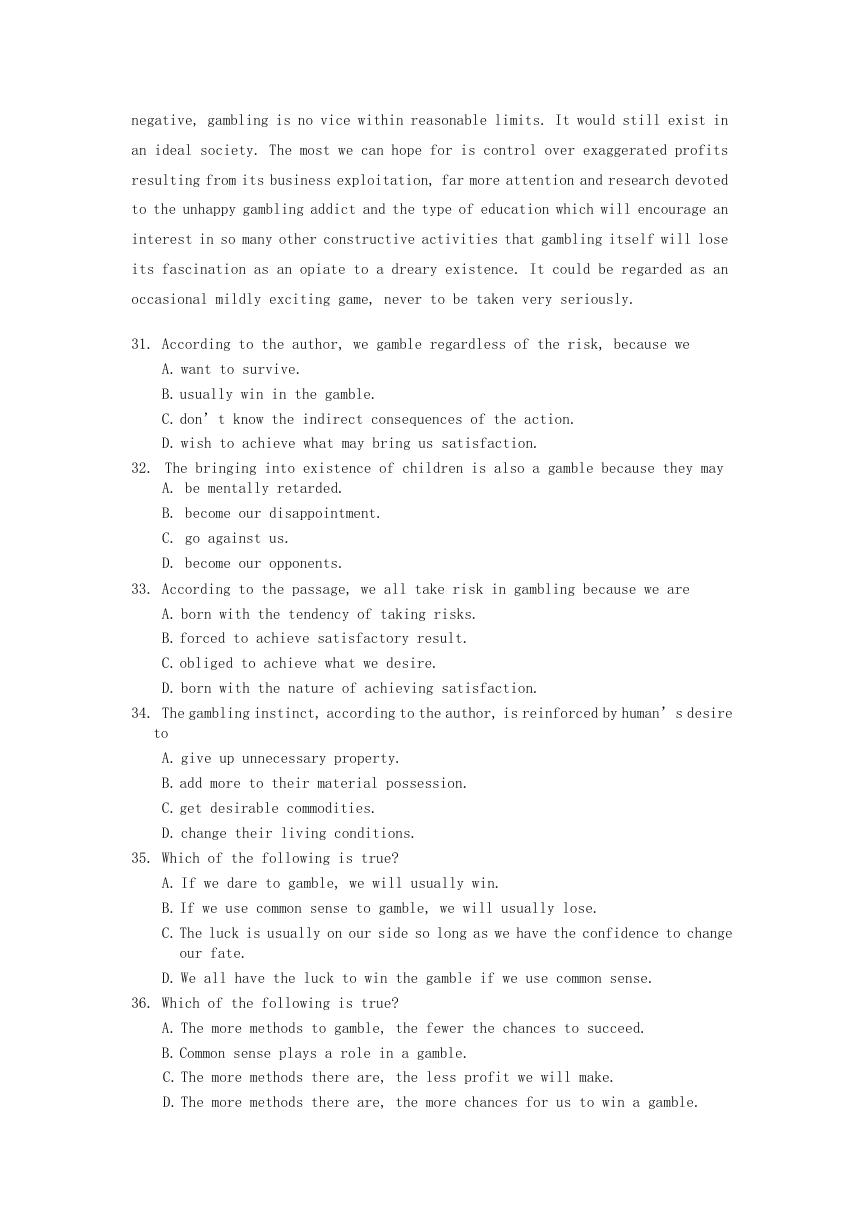
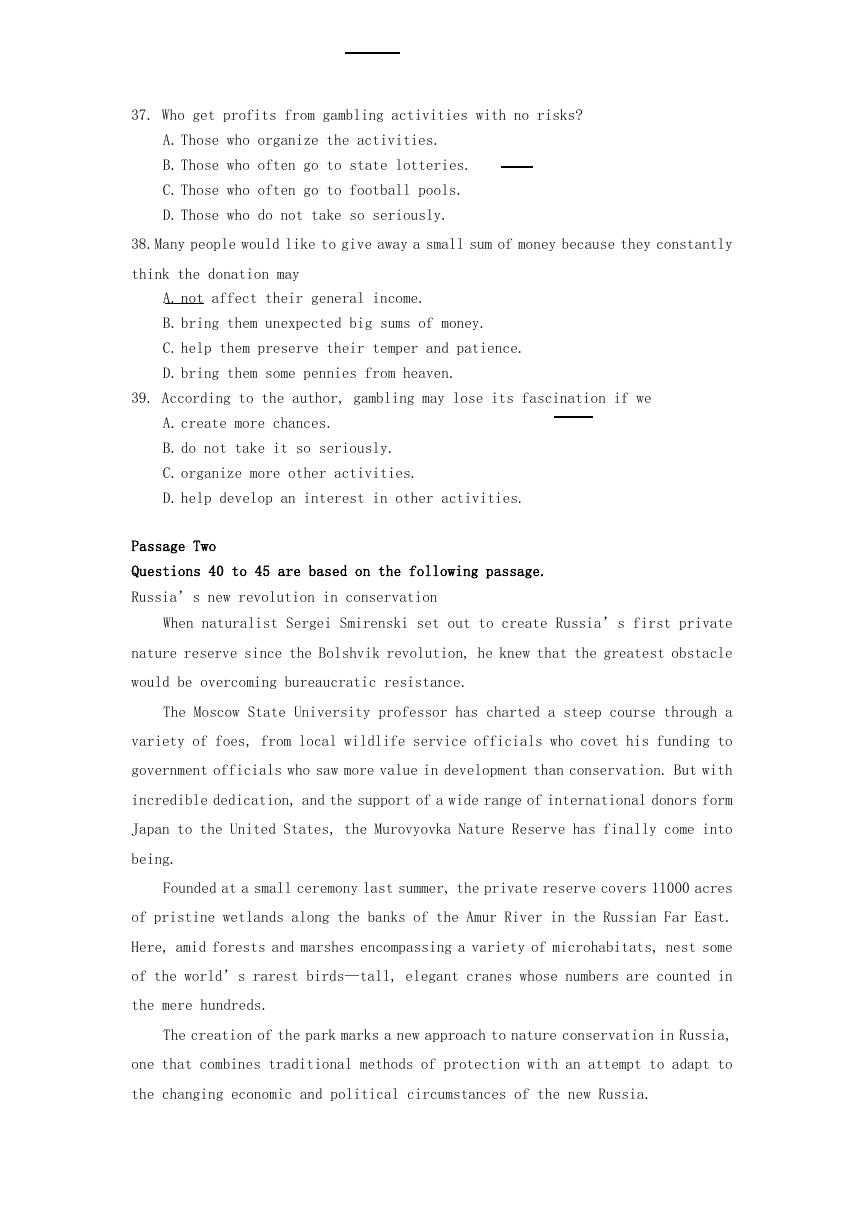
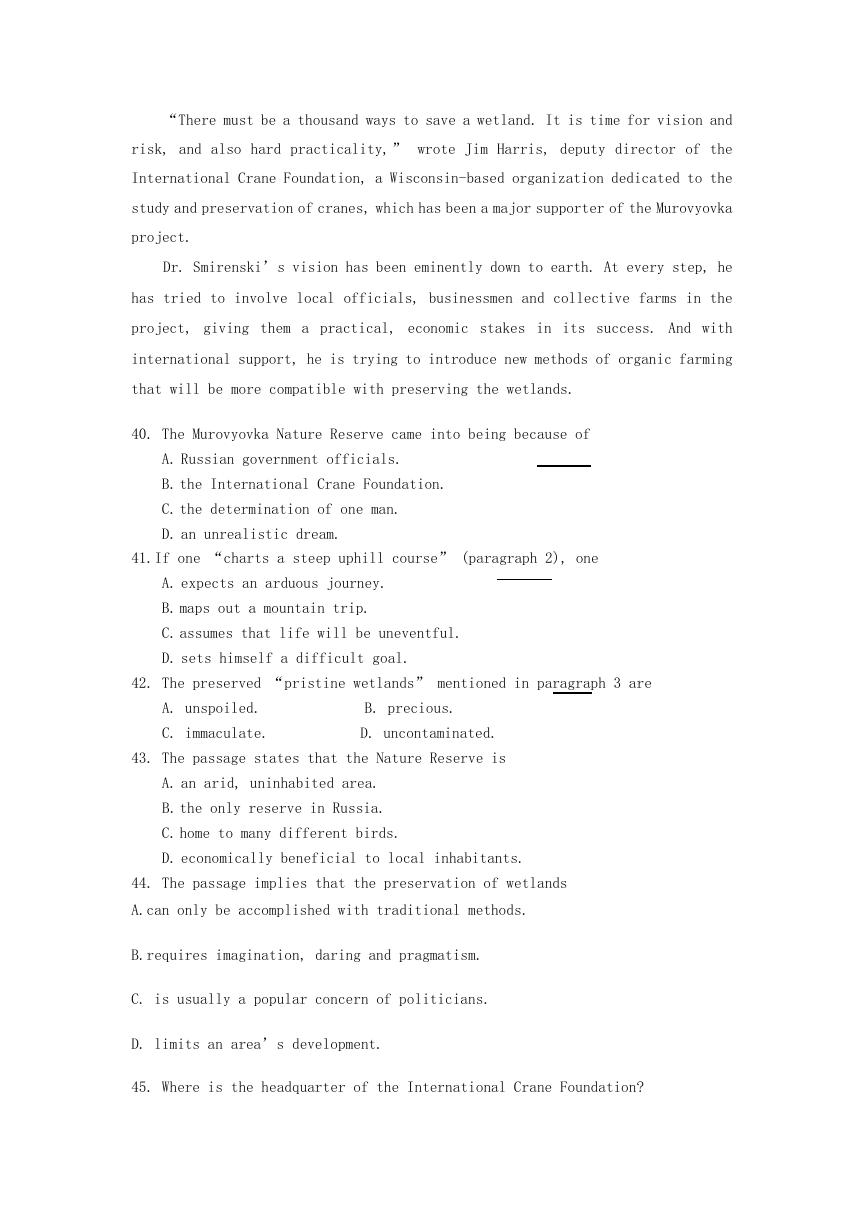








 2023年江西萍乡中考道德与法治真题及答案.doc
2023年江西萍乡中考道德与法治真题及答案.doc 2012年重庆南川中考生物真题及答案.doc
2012年重庆南川中考生物真题及答案.doc 2013年江西师范大学地理学综合及文艺理论基础考研真题.doc
2013年江西师范大学地理学综合及文艺理论基础考研真题.doc 2020年四川甘孜小升初语文真题及答案I卷.doc
2020年四川甘孜小升初语文真题及答案I卷.doc 2020年注册岩土工程师专业基础考试真题及答案.doc
2020年注册岩土工程师专业基础考试真题及答案.doc 2023-2024学年福建省厦门市九年级上学期数学月考试题及答案.doc
2023-2024学年福建省厦门市九年级上学期数学月考试题及答案.doc 2021-2022学年辽宁省沈阳市大东区九年级上学期语文期末试题及答案.doc
2021-2022学年辽宁省沈阳市大东区九年级上学期语文期末试题及答案.doc 2022-2023学年北京东城区初三第一学期物理期末试卷及答案.doc
2022-2023学年北京东城区初三第一学期物理期末试卷及答案.doc 2018上半年江西教师资格初中地理学科知识与教学能力真题及答案.doc
2018上半年江西教师资格初中地理学科知识与教学能力真题及答案.doc 2012年河北国家公务员申论考试真题及答案-省级.doc
2012年河北国家公务员申论考试真题及答案-省级.doc 2020-2021学年江苏省扬州市江都区邵樊片九年级上学期数学第一次质量检测试题及答案.doc
2020-2021学年江苏省扬州市江都区邵樊片九年级上学期数学第一次质量检测试题及答案.doc 2022下半年黑龙江教师资格证中学综合素质真题及答案.doc
2022下半年黑龙江教师资格证中学综合素质真题及答案.doc